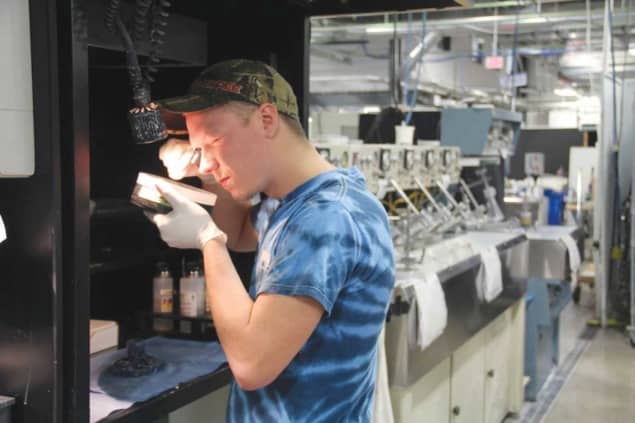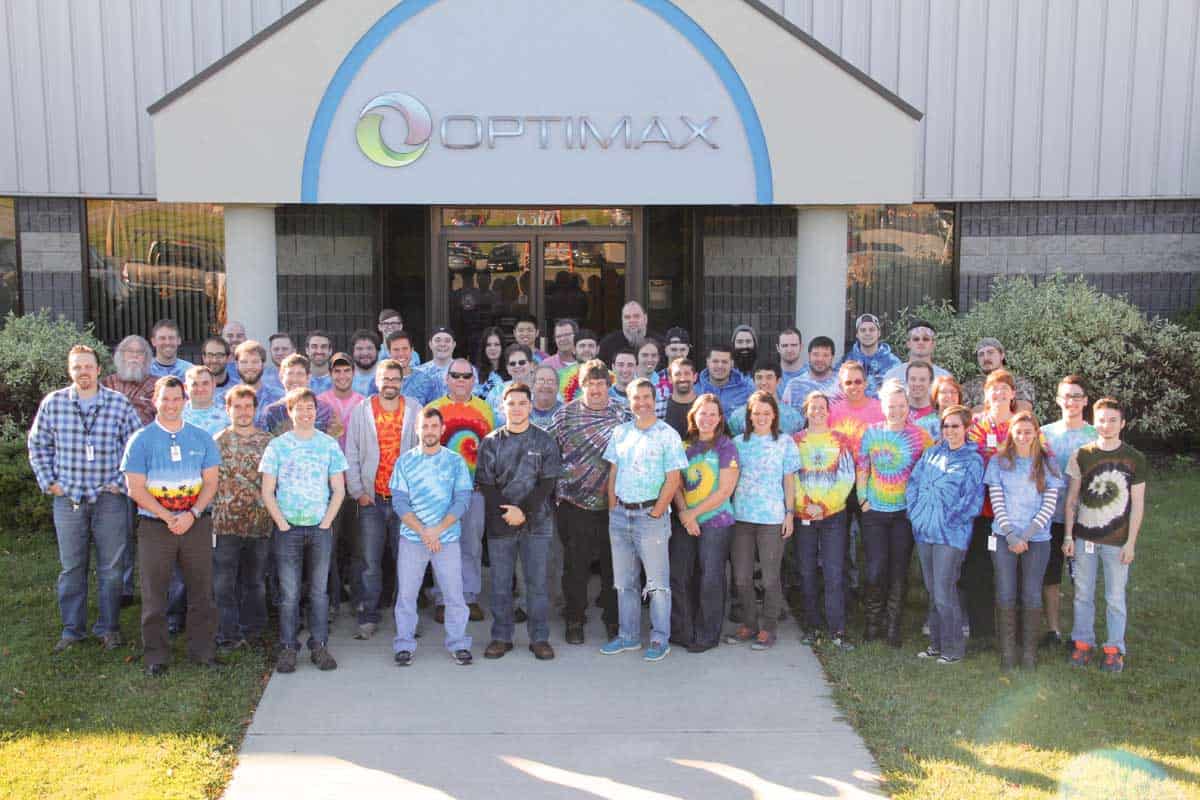Mike Mandina and Rick Plympton talk about the factors that have helped their small-town optics manufacturing firm, Optimax, survive and thrive in an often difficult climate

What led you to start Optimax?
Mike Mandina, Optimax president I lost my job so I had a choice: I could either go work for someone else or create something new. By chance, I met a couple of entrepreneurs who had partnered with some people who were moonlighting from day jobs at Kodak. They had set up the beginnings of an optics shop in the basement of a barn. It had a concrete floor, sawdust and dirt would fall down from the ceiling if it was windy outside, and the low ceilings limited what kind of machinery could go in there. But it had a lot of power, and they had found and refurbished a number of pieces of equipment, so it was enough to get started making rudimentary optics – the basic elements of traditional lens manufacturing. That’s what became Optimax.
What had your career been like before that?
MM I went to university to study sociology and psychology, but after one semester I transferred over to the optics programme at Monroe Community College, working on an associate’s degree in optics technology. I did just over a year of full-time college and then I got a job in the optics industry, grinding lenses on the second shift. Because I was working nights, I was able to continue my education during the day. Eventually, I earned a bachelor’s degree in applied physics from Empire State College and an executive MBA from the Rochester Institute of Technology (these are all in New York, by the way). I founded my first optics company with a partner back in 1976 and sold it to Melles Griot around five years later. It became Melles Griot Optical Systems and that was the company that let me go in 1990.
Rick, how did you get involved in Optimax?
Rick Plympton, Optimax CEO I grew up in the Rochester area and my education was similar to Mike’s in that I went to the Florida Institute of Technology for a year, but I spent more time on the beach than I did in classes. So I came back and continued my education at Finger Lakes Community College in New York, US before transferring to the optical engineering programme at the University of Rochester. The first time Mike hired me was in 1984, when he was the production manager for Melles Griot Optical Systems and I was a student. We worked together for three or four years and then I went off and chased my career, working at Melles Griot’s corporate headquarters in southern California, as a field sales engineer in the south-east US and eventually at Melles Griot in Europe. After two years there, though, I came back to Rochester because this is where family is. I’d kept in touch with Mike throughout, and when I came back in 1995 there were 10 guys here struggling to make weekly payroll. Manufacturing was fleeing the Rochester community at the time: Kodak, Bausch and Lomb, Xerox, all the big players were downsizing and sending their manufacturing offshore. But when I looked at what Mike and the guys at Optimax were doing, I saw they were leveraging computer-controlled machining technology to make optical components and that meant they could make prototype lenses 10 times faster than the industry standard. Normally it takes about 10 weeks to make a lens; these guys could do it in a couple of days. So we developed a marketing plan around one-week delivery of prototype optics and started growing the business.
How did you get funding to expand beyond the barn?
MM In the very early days some of the founders put in about $30,000 in cash. The rest was credit cards and leases, and if there wasn’t enough cash coming in, the principals didn’t get paid. Rick was one of several people willing to not exactly get paid a lot of money for believing in the future. A number of those people are still here because they hung on and ultimately we developed great careers for them. They helped build the company.
RP By the time I joined, I knew the optics industry all over the US and Europe, so I went out and bragged about the capability that Optimax had developed using this new machining technology. And we really focused on being the prototype guys. Most factories are set up to do production work, so that niche – high-quality prototype optics, quick delivery if you need it – gave us an advantage in the market. And from 1995 to now, we’ve grown the business by about 25% per year.

What have been the biggest challenges?
RP Workforce development. We cannot go out on the street and hire people who know how to do what we do – we have to train everybody. The best we can do is find people who have good foundational skills through their hobbies, education or work experience. But aside from that, what’s most important is that they’re the type of people who want to learn and contribute.
What kind of technical background do you look for?
MM As time has gone on, the easy manufacturing has moved to countries with lower costs, so the complexity and difficulty of the optics that are left to be manufactured in the US has grown tremendously. Some optics can cost up to $100 000 and take months to fabricate, and they require sophisticated equipment, instruments and technical skills. We have an interesting cross-section of people at Optimax – anything from PhDs to GEDs, which in the US is the equivalent of a high-school diploma that you earn through night school. Optics manufacturing is still a cross between technology and art, so we look for people who have both a technical and an artisan mindset. They may or may not have terrific academic credentials, but if they can be productive, if they’re good people who like working with others to create value, and if they’re prepared to rely on each other for their family’s future prosperity – then Optimax is a good place for them.
What was your most difficult moment?
MM Back in the early days I had about a dozen people working for six weeks to ship products to a particular customer. Unbeknown to me, this customer was developing their own in-house capability and suddenly they sent everything back, cancelled the order and refused to pay. And that was that! It was not very nice. Most people in the industry don’t behave that way, but the person who was running this firm was a certain type of – well, anyway, that’s how they behaved. It didn’t kill us but it was very stressful trying to keep our people employed and find replacement work. That was around the time that Plympton showed up, so that was good timing; we were able to patch things up and keep going. But that could have been a defining moment for us – it was a defining moment for us. Since that time, by the way, we’ve done other work with that customer. They do pay a premium.
What are your plans for the future?
MM We’ve got big plans. Real big plans. I mean, real big!
RP Okay, enough Trump jokes – let’s see if we can give a better answer. We’re hiring about 50 people a year and our core business of optical components could easily triple in the next five to seven years, but we’re looking at ways to grow beyond that. So Mike and I have been putting together a spin-out programme for employees who are entrepreneurial-minded and want to think about market challenges that are outside our core capabilities. We’ll look at their ideas and we may fund a few new businesses, so 10 or 15 years down the road we might look more like an Optimax family of companies, addressing a multitude of market needs.
What do you know now that you wish you’d known when you started?
MM Some of the stuff you learn in business school is fundamental and will always work. But other things, by the time they do the research and understand how they work, then society, culture, the whole world has changed and those models don’t necessarily hold up anymore. Breaking away from those traditions in a sensible way sometimes pays.
RP I’d say that business schools are maybe not teaching what you need to know to grow a progressive company. Here’s an example: we take 25% of our profit every month and share it with employees. We know if we sold this business to a multinational corporation run by a bunch of MBAs, one of the first things they’d do is throw this bonus plan out the window. But we believe it’s been key to our success through the years. We also do some things to keep communication going and maintain a family sort of environment, such as monthly parties and a fun committee. We run three shifts around the clock five days a week, and building camaraderie among the different shifts is a big challenge that we’ve wrestled with through the years.
MM Another example is that we’re trying to keep our organizational structure flat. We’re at 300 employees now, and at times we’ve got to a place where the market wanted us to grow, but we couldn’t grow profitably because whatever we were doing up to that point didn’t work anymore. Things you do to run a business of 25 people don’t work as well at 50 people, and when you figure out how to run things with 50 people, that doesn’t work as well at 100 people, and so on. You start having more overhead costs; communication suffers; you’re in a bigger space; you have more geographic distances between people; your employees are in departments, so you start generating silos – it’s been quite an education about what not to do.
Any advice for someone thinking of starting a new optics firm?
MM They should come see us. Maybe we’ll partner with them! But seriously, I’d say you have to have passion in what you’re doing because there’s going to be impediments along the way, and you can choose to cave in at any time. We’ve had our trying moments – it’s not all upward rising. Things like the Great Recession happen, or a problem can occur with a technology or a customer. You’ve got to suffer through it. I think most people who’ve run a business have had to do those gut checks along the way.
RP If you’re starting out, you want to make sure you’re developing a capability that will enable others to be successful. The more you can help other people be successful with their programmes, the better shot you have at being successful in the long run.



